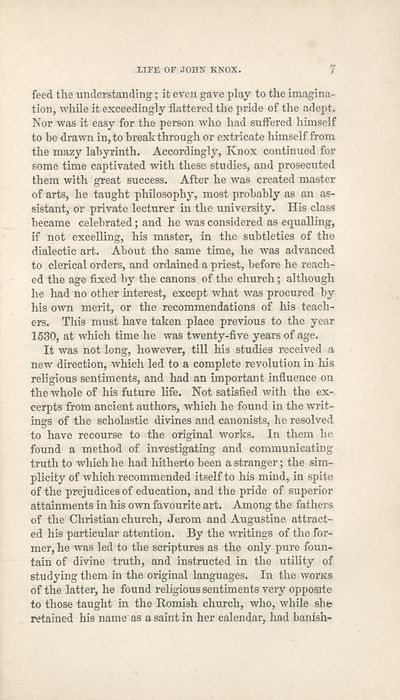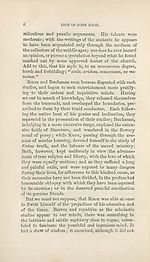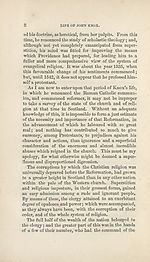Download files
Complete book:
Individual page:
Thumbnail gallery: Grid view | List view

LIFE OF JOHN KNOX.
feed the understanding; it even gave play to the imagina¬
tion, while it exceedingly flattered the pride of the adept.
Nor was it easy for the person who had suffered himself
to be drawn in, to break through or extricate himself from
the mazy labyrinth. Accordingly, Knox continued for
some time captivated with these studies, and prosecuted
them with great success. After he was created master
of arts, he taught philosophy, most probably as an as¬
sistant, or private lecturer in the university. His class
became celebrated; and he was considered as equalling,
if not excelling, his master, in the subtleties of the
dialectic art. About the same time, he was advanced
to clerical orders, and ordained a priest, before he reach¬
ed the age fixed by the canons of the church; although
he had no other interest, except what was procured by
his own merit, or the recommendations of his teach¬
ers. This must have taken place previous to the year
1530, at which time he was twenty-five years of age.
It was not long, however, till his studies received a
new direction, which led to a complete revolution in his
religious sentiments, and had an important influence on
the whole of his future life. Not satisfied with the ex¬
cerpts from ancient authors, which he found in the writ¬
ings of the scholastic divines and canonists, he resolved
to have recourse to the original works. In them he
found a method of investigating and communicating
truth to which he had hitherto been a stranger; the sim¬
plicity of which recommended itself to his mind, in spite
of the prejudices of education, and the pride of superior
attainments in his own favourite art. Among the fathers
of the Christian church, Jerom and Augustine attract¬
ed his particular attention. By the writings of the for¬
mer, he was led to the scriptures as the only pure foun¬
tain of divine truth, and instructed in the utility of
studying them in the original languages. In the worxs
of the latter, he found religious sentiments very opposite
to those taught in the Romish church, who, while she
retained his name as a saint in her calendar, had banish-
feed the understanding; it even gave play to the imagina¬
tion, while it exceedingly flattered the pride of the adept.
Nor was it easy for the person who had suffered himself
to be drawn in, to break through or extricate himself from
the mazy labyrinth. Accordingly, Knox continued for
some time captivated with these studies, and prosecuted
them with great success. After he was created master
of arts, he taught philosophy, most probably as an as¬
sistant, or private lecturer in the university. His class
became celebrated; and he was considered as equalling,
if not excelling, his master, in the subtleties of the
dialectic art. About the same time, he was advanced
to clerical orders, and ordained a priest, before he reach¬
ed the age fixed by the canons of the church; although
he had no other interest, except what was procured by
his own merit, or the recommendations of his teach¬
ers. This must have taken place previous to the year
1530, at which time he was twenty-five years of age.
It was not long, however, till his studies received a
new direction, which led to a complete revolution in his
religious sentiments, and had an important influence on
the whole of his future life. Not satisfied with the ex¬
cerpts from ancient authors, which he found in the writ¬
ings of the scholastic divines and canonists, he resolved
to have recourse to the original works. In them he
found a method of investigating and communicating
truth to which he had hitherto been a stranger; the sim¬
plicity of which recommended itself to his mind, in spite
of the prejudices of education, and the pride of superior
attainments in his own favourite art. Among the fathers
of the Christian church, Jerom and Augustine attract¬
ed his particular attention. By the writings of the for¬
mer, he was led to the scriptures as the only pure foun¬
tain of divine truth, and instructed in the utility of
studying them in the original languages. In the worxs
of the latter, he found religious sentiments very opposite
to those taught in the Romish church, who, while she
retained his name as a saint in her calendar, had banish-
Set display mode to:
![]() Universal Viewer |
Universal Viewer | ![]() Mirador |
Large image | Transcription
Mirador |
Large image | Transcription
| Antiquarian books of Scotland > Scotland/Scots > Life of John Knox ; and, The life of Alexander Henderson > (25) |
|---|
| Permanent URL | https://digital.nls.uk/131832604 |
|---|
| Description | Thousands of printed books from the Antiquarian Books of Scotland collection which dates from 1641 to the 1980s. The collection consists of 14,800 books which were published in Scotland or have a Scottish connection, e.g. through the author, printer or owner. Subjects covered include sport, education, diseases, adventure, occupations, Jacobites, politics and religion. Among the 29 languages represented are English, Gaelic, Italian, French, Russian and Swedish. |
|---|

